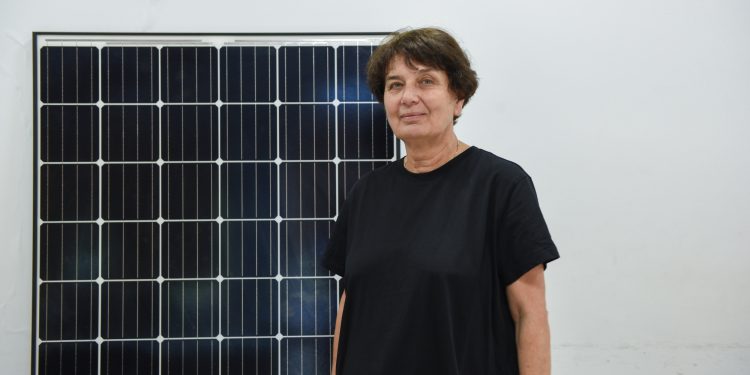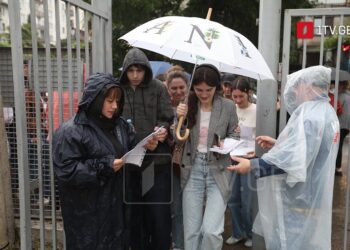In a groundbreaking project led by the Kakheti NGO and supported by CENN and the European Union, the village of Kasristskali, located in Akhmeta Municipality, Georgia, was chosen to receive renewable energy solutions aimed at both improving local infrastructure and raising awareness about climate change. The project involved the installation of a 3-kilowatt solar power station at the newly renovated kindergarten in Kasristskali, providing reliable, sustainable energy to the community. Shorena Chapurishvili, a representative of the Kakheti NGO, shared her insights on the project’s selection process, its impact on the community, and the broader potential for similar initiatives in other rural areas.
The Selection of Kasristskali
The choice of Kasristskali as the site for the solar power project was based on a careful assessment of the village’s specific needs and circumstances. “We conducted research in the villages of Akhmeta Municipality, and Kasristskali stood out due to several factors,” explained Shorena. “First of all, Kasristskali is quite far from the administrative center—about 200 kilometers—which made it difficult for the village to access consistent power supply. The population is poorer compared to other areas, and there was a lack of awareness about renewable energy.”
In addition to these logistical challenges, the village had recently completed a renovation of its kindergarten, which had no stable power source to support its educational activities. “The kindergarten was newly renovated, and it was crucial for it to have an uninterrupted power supply,” Shorena noted. “This was something that could be reliably provided through solar energy, and it became clear that solar power would be the ideal solution to meet both the energy needs of the kindergarten and the community.”
The decision to implement the project in Kasristskali highlights a thoughtful approach, addressing both immediate energy concerns and the longer-term goal of raising awareness about sustainable practices in remote, underserved areas.
Raising Awareness
While the installation of the solar power station was a central element of the project, another significant goal was to foster a deeper understanding of climate change and renewable energy among the local population, especially the youth. The NGO organized a series of training sessions to engage both the younger generation and the wider community in discussions about environmental challenges and solutions.
“Within the framework of the project, we held training sessions on climate change, renewable energy, and disaster risk reduction,” Shorena shared. “These sessions were especially important for the younger generation, and we organized them not only for the people of Kasristskali but also for the neighboring villages.”
The training focused on a range of critical topics, including the challenges of climate change, the role of renewable energy in mitigating environmental issues, and the sustainable management of natural resources. “The project ignited a local dialogue on the importance of renewable energy and climate action,” Shorena explained. “We saw an increase in awareness about environmental issues, and it helped shape a more sustainable outlook for the local community.”
One of the goals of these workshops was to ensure that the people of Kasristskali, particularly the youth, understood the vital connection between renewable energy and climate change solutions. By fostering a sense of ownership and responsibility toward the environment, the project not only provided a renewable energy source but also created a foundation for sustainable, long-term practices in the village.
Inspiration for Broader Initiatives
The success of the solar power project in Kasristskali has inspired further renewable energy initiatives in other remote regions of Georgia. “This project is not just important for Kasristskali, but it has also positively affected the neighboring villages,” Shorena said. “The success of this initiative motivated us to set up a solar power plant in the village of Bochorna in Tusheti, which has never had electricity before.”
Bochorna, located in the mountainous Tusheti region, was previously off the grid, and providing solar energy to this village represents a significant leap forward. “Now, thanks to the experience gained from the Kasristskali project, we are able to bring renewable energy to a community that has long been off the grid,” Shorena added. This expansion demonstrates how successful models can be replicated in other underserved areas, using renewable energy as a tool for both economic development and environmental protection.
Shorena’s words highlight the potential for scaling up this initiative to benefit many more villages across Georgia, particularly those in remote or rural areas where access to energy has historically been limited. With the knowledge gained from the Kasristskali project, the Kakheti NGO and its partners are now well-positioned to implement similar solar power systems in other communities, transforming energy access across the region.
Collaboration as a Key to Success
A key factor in the success of this project was the collaboration with CENN and the European Union, whose support was instrumental in bringing the project to fruition. “CENN has been an essential partner in making this project a reality,” Shorena acknowledged. “Their support, resources, and technical expertise have been invaluable. They played a crucial role in coordinating the technical aspects of the solar energy installation and ensuring the long-term sustainability of the project.”
The technical expertise provided by CENN ensured that the solar power system was designed and installed to meet the specific needs of the kindergarten while also being robust enough to ensure longevity and efficiency. “The system works very well, providing continuous lighting,” Shorena said. “It ensures that the kindergarten has a stable power supply, which is crucial for both safety and comfort.” The project’s sustainability was also guaranteed by the ongoing involvement of local stakeholders, with the kindergarten administration taking responsibility for the system’s maintenance.
Additionally, the support of the European Union allowed the project to expand its reach, enhancing both the technical capacity of the solar installation and the educational component. “The EU’s contribution helped us not only with the financial resources but also with the coordination of various partners and stakeholders, which was key to the success of the initiative,” Shorena explained.
Engaging the Youth with Climate Change
The educational aspect of the project extended beyond the training sessions and included hands-on activities aimed at engaging children with climate change in creative and meaningful ways. One such event, “Child and Sun,” was organized to help children understand the importance of the sun as a renewable energy source. “Children’s events like ‘Child and Sun’ were important because they connected the younger generation with climate change in a creative and meaningful way,” Shorena explained. “The kids created climate-related paintings in the kindergarten, which further raised awareness about the environmental issues they are facing.”
By involving children in such activities, the project ensured that they not only learned about climate change and sustainability but also actively participated in spreading the message to their families and communities. These events are critical in shaping a future generation that values sustainability and is proactive in addressing climate challenges.
A Model for the Future
The project in Kasristskali represents a transformative model for how renewable energy can be integrated into rural communities, providing reliable power while simultaneously fostering a deeper understanding of climate change and sustainability. As Shorena Chapurishvili pointed out, the success of the project is not just measured in terms of the solar power station installed, but in how it has sparked a broader conversation about climate action and renewable energy solutions. “This initiative has set a precedent for other villages in Georgia and beyond,” she concluded. “It shows that with the right support, rural communities can embrace renewable energy and build a more sustainable future.”
Through collaborative efforts, educational outreach, and sustainable energy solutions, the Kasristskali project has demonstrated the profound impact that renewable energy can have on both the environment and local communities. With the support of CENN and the European Union, this project has become a beacon of hope and a model for similar initiatives across Georgia. The positive outcomes in Kasristskali are not just about solar energy—they are about fostering a sense of responsibility toward the environment, creating lasting community impact, and empowering the next generation to take action on climate change.
As this model spreads to other villages, it holds the potential to significantly improve the quality of life for underserved communities, providing them with both sustainable energy and the tools to combat the challenges posed by climate change. The future looks bright, thanks to solar power and the efforts of those working to create a more sustainable world.














